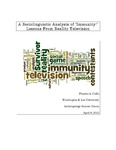| dc.rights.license | In Copyright | en_US |
| dc.creator | Cullo, Francis Anthony | |
| dc.date.accessioned | 2013-01-17T15:41:28Z | |
| dc.date.available | 2013-01-17T15:41:28Z | |
| dc.date.created | 2012 | |
| dc.identifier | WLURG38_Cullo_SOAN_2012 | |
| dc.identifier.uri | http://hdl.handle.net/11021/23756 | |
| dc.description | Thesis; [FULL-TEXT RESTRICTED TO WASHINGTON AND LEE UNIVERSITY LOGIN] | en_US |
| dc.description | Francis Anthony Cullo is a member of the Class of 2012 of Washington and Lee University. | en_US |
| dc.description.abstract | Through sociolinguistics, the paper explored how immunity changes throughout the course of a Survivor season. It surveyed the way that contestants treat public forms of immunity -- tribal immunity idol and the individual immunity necklace -- and private immunity in the form of the hidden immunity. If speech events on television can be said to be representative of larger cultural patterns in American society, then Survivor represents an intriguing permutation on that formula. It is both a product of the various contestants' cultural biases as well as its environment. The speech events witnessed in this television show are dramatized social interactions, which force human beings to constantly compete socially or physically. Dell Hymes's SPEAKING model, which prioritizes the role of cultural competence provided the best avenue through which to explore these new competitive norms. The game structure, particularly the use of contestant confessionals, changed the way human beings interact within Survivor. Hymes' ideas allowed this study the appropriate framework to probe these ideas. For example, sociolinguistic analysis unearthed the importance of Setting and Scene to conversation genre that may have been missed by other forms of linguistic or ethnographic analysis. Within Survivor immunity is an example of language, but Hymes argues that it is communication that really demonstrates the full breadth of the concept (Hymes 1974: 4). In order to explore what immunity means as a concept then Hymes's SPEAKING model provided the frame of reference to fully explore the question. [From the Conclusion] | en_US |
| dc.description.statementofresponsibility | Francis A. Cullo | |
| dc.format.extent | 106 pages | en_US |
| dc.language.iso | en_US | en_US |
| dc.rights | This material is made available for use in research, teaching, and private study, pursuant to U.S. Copyright law. The user assumes full responsibility for any use of the materials, including but not limited to, infringement of copyright and publication rights of reproduced materials. Any materials used should be fully credited with the source. | en_US |
| dc.rights.uri | http://rightsstatements.org/vocab/InC/1.0/ | en_US |
| dc.subject.other | Washington and Lee University -- Honors in Anthropology | en_US |
| dc.title | A Sociolinguistic Analysis of 'Immunity': Lessons from Reality Television (thesis) | en_US |
| dc.type | Text | en_US |
| dcterms.isPartOf | RG38 - Student Papers | |
| dc.rights.holder | Cullo, Francis Anthony | |
| dc.subject.fast | Sociolinguistics -- Research | en_US |
| dc.subject.fast | Reality television programs | en_US |
| dc.subject.fast | Oral communication | en_US |
| local.department | Anthropology | en_US |
| local.scholarshiptype | Honors Thesis | en_US |
